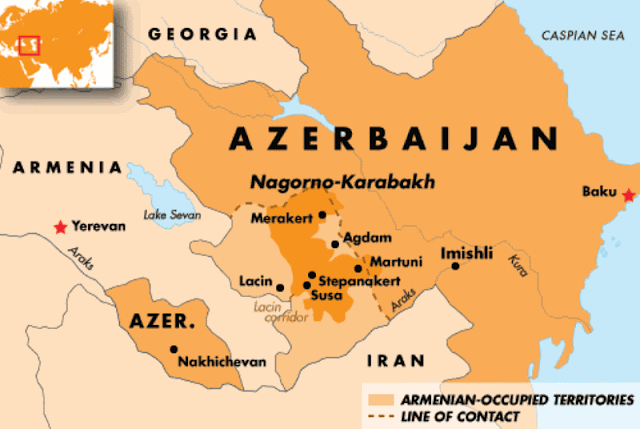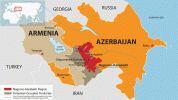I was not too sure whether to open a new thread about the conflict between Armenia and Azerbaijan, but as it is still about the conflict between the Western empire and Russia, it is valid to post it here. Thorbiorn has already posted about it and here is another article that explains a bit more and also the appearance of war so to be in a better bargaining position. Lavrov is meeting the Azerbaijani president on the 7th of April so that could explain it as the author of this article thinks:
http://www.fort-russ.com/2016/04/armenia-azerbaijan-simulation-of-war.html
http://www.fort-russ.com/2016/04/armenia-azerbaijan-simulation-of-war.html
Armenia-Azerbaijan: Simulation of War

April 2, 2016
Kommersant
Translated by Kristina Kharlova
“Kommersant” observer Maxim Yushin — on causes of the new escalation in the Karabakh conflict zone
Judging by the statements coming from Yerevan, Baku and Stepanakert, you might think that a big war has already broke out in the region. But "offensive across the entire line of contact" reported in the last hours, looks quite different. In fact, we observe local skirmishes, albeit very intense, and battles of local importance that are unlikely to result in anything more serious.
None of the parties are now ready to start a big war. With the Armenian side it is clear — it will not launch it by definition. War may only be started by the party which lost in the previous war, and the 1992-94 conflict ended with the victory of Armenians. Today, they control not only almost the entire territory of Nagorno-Karabakh, but also (fully or partially) the seven districts of Azerbaijan. There is no reason for Armenians to capture anything else, their interest is to maintain the status quo.
Another thing is Azerbaijan. The return of the "occupied territories" — is a national idea, goal, dream. That in case of the failure of peace talks Baku will be ready to force the return of Aghdam, Fuzuli, Lachin and Stepanakert, officials and president Aliev periodically remind the fellow citizens and international community. One of the most reliable ways to make the world remember Karabakh conflict, not to allow to completely freeze it, is to maintain tension on the contact line. Thus it has been long noticed — the situation in Karabakh and around it often intensifies on the eve of important international negotiations. And they are coming next week — on April 7 the foreign minister of Russia Sergey Lavrov is flying to Baku.
At the official level, the rhetoric of Azerbaijani authorities is very aggressive. When I was recently in Baku, not a single person missed a chance to tell me that Azerbaijan's military budget exceeds the entire budget of Armenia. Thanks to petrodollars Baku can really afford to spend much more on the needs of the armed forces than Yerevan. And today the Azerbaijani army is very different from that which was defeated by Armenians twenty years ago.
But, as I was told by Russian and Western sources familiar with the situation, deep inside Azerbaijani politicians and military continue to fear a potential enemy and want to avoid a serious clash. Too strong is the shock from the defeats of the 1990-ies. And by and large, there can be no assurance that in the event of a new war — real, not demonstrative — Baku will be able to win. Despite the modernization of the army in recent years, there is a parity between the armament of the Azerbaijani and Armenian forces (if you combine forces of Nagorno Karabakh and Armenia itself). Besides, Armenia is Russia's ally, is included in the CSTO, i.e. in case of attack on its territory (outside Nagorno-Karabakh) theoretically there is a risk of Moscow getting involved in the conflict.
And Baku knows it. As they understand, that if a full-scale war breaks out, all the relative well-being, which the authorities have achieved in the last decade — before oil prices plunged, followed by the collapse of the national currency — manat, will be under threat. Social problems in Azerbaijan had exacerbated in recent years, but nowhere close to how they will deepen if the country is drawn into conflict with Armenia, during which it is impossible to exclude strikes on oil fields, pipelines, and other industrial facilities.
Being a pragmatist, Ilham Aliyev does not want to risk the current stability for the sake of war with unpredictable outcome. But public opinion (especially media, as well as part of the Azerbaijani elite) today is very determined, if not revanchist. The authorities have to consider this fact. And occasionally mimic activity at the fronts, so the people don't get the impression that the president accepted defeat and the loss of the "occupied lands".
In other words, stabilization in the conflict zone cannot be expected in the foreseeable future . The war will be periodically simulated. And it's bad news. But there is good news: imitation of war is still not a war.
***
KK: Russia has been very careful not to take sides in the conflict between Armenia and Azerbaijan in order not to upset the delicate balance, seeking closer relations with both countries and maintaining peace in the Caucasus, however Turkey and USA had professed their support for Azerbaijan, which may provide it with too much dangerous confidence. Incidentally, Azerbaijani president was visiting Washington during the break out of the new round of hostilities.



